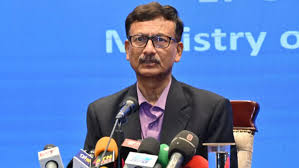
Foreign Affairs Adviser M Touhid Hossain has said that India-Bangladesh ties should not be "regime-specific," and both countries should focus on mutual interests rather than past patterns of engagement. He noted that initial tensions arose after the abrupt end of Sheikh Hasina's tenure, but six months into the interim government, interactions have improved significantly, particularly in trade. Despite temporary setbacks, trade volumes have resumed, signalling a willingness among private sectors to continue cooperation.In an interview with Indian newspaper The Hindu after talks with Indian External Affairs Minister S. Jaishankar at the 8th Indian Ocean Conference in Muscat, Touhid Hossain addressed key issues straining bilateral relations between the two nations. The interim government, led by Chief Adviser Muhammad Yunus, is working to stabilise ties while addressing concerns such as Hasina’s extradition, minority violence, border killings, and disputes over the Adani power project.
Regarding former Prime Minister Sheikh Hasina, who fled to India following her resignation on August 5, 2024, Touhid iterated Bangladesh's request for extradition. Cases against Hasina are currently before courts, and warrants have been issued for crimes allegedly committed during her 15-year rule. While acknowledging the legal process required under the extradition treaty, Hossain urged India to restrict Hasina from making inflammatory statements that could destabilise Bangladesh.
He said, "A mob may act impulsively, but the government does not support such actions." This came in response to incidents like the vandalism of Sheikh Mujibur Rahman's house, allegedly triggered by Hasina's speeches. However, Hossain insisted that these isolated events do not reflect official policy.
When asked about India’s concerns regarding minority violence in Bangladesh, Touhid clarified that Hindu and other minority communities enjoy equal rights and protection under the law. He dismissed exaggerated reports in Indian media, pointing to a recent UN report commissioned by Bangladesh's interim government. The report concluded that the administration has taken adequate measures to safeguard minorities, countering claims of persecution.
On border security, Touhid criticised the practice of shooting individuals crossing borders illegally, calling it unjustifiable and outdated. In 2024 alone, 24 people were killed along the Bangladesh-India border, sparking criticism from human rights groups. Hossain argued that suspects should be arrested and tried instead of summarily executed.
Touhid discussed ongoing negotiations with the Adani Group concerning power supply agreements. While Bangladesh seeks restoration of electricity imports, the interim government aims to renegotiate terms deemed unfavourable, particularly high power tariffs and coal procurement costs. Hossain stressed the importance of purchasing coal at competitive global prices, ensuring fairness and transparency in the deal.
"We will review the agreement in good faith and aim to make it more rational," he said, adding that restoring power supply remains crucial for Bangladesh's energy needs.
Despite no formal meeting yet between Prime Minister Narendra Modi and Chief Adviser Muhammad Yunus, Touhid expressed optimism about their potential encounter at the upcoming BIMSTEC Summit in April. Though specific arrangements remain undecided, he highlighted the value of direct dialogue between leaders, noting its ability to resolve complex issues swiftly compared to prolonged negotiations.
Touhid also reflected on historical ties, emphasising that strong India-Bangladesh relations existed even under previous administrations, citing the Ganga Water Agreement signed during the BNP era (1996-1997). He advocated for normalized relations based on shared interests and respect, regardless of political regimes.


